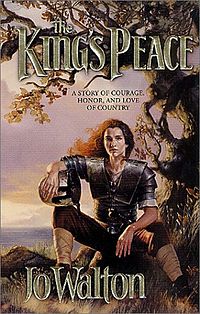When I was a teenager and started to write seriously, I discovered that I was allergic to how-to-write books. I was also too secretive (and also traumatised by the times I tried it) to show my writing to anyone so I didn’t go to any classes or workshops or anything, ever. I still never have. This meant that I was writing and learning to write entirely on my own, and that I didn’t have any words for the techniques I was figuring out. Therefore, I developed my own vocabulary for talking about writing, which I happily used for talking to myself about writing for the next fifteen years or so. I then acquired some friends who wrote, and acquired some of the proper words for talking about writing.
I also discovered that some of the terms I’d made up didn’t have proper versions, or didn’t map well onto proper versions.
Incluing — the process of giving information subtly without resorting to an infodump — they didn’t have a word for incluing? How do people do it if they don’t have a word for it? (Sapir-Whorf must be wrong!) The thing about this word (which got released into the wild on rec.arts.sf.composition by someone I’d used it to who had assumed it was a real word) is that it’s immediately clear what it means and immediately useful.
Most of my other terms were fairly easily translatable, but one that really wasn’t was “mode”. “Mode”, when I tried to explain it on rasfc, turned out to be very slippery to most people and a big problem to some others.
Mode is what I need before I start writing. Mode controls how I tell the story. It is a distinct thing. It controls voice and POV and what I call stance, but I’m sure there’s a proper word for. (Stance is where you stand to tell the story — close and involved, distant and ironic, reliable or unreliable — and where your percieved reader stands. The story then is shaped into the gap between — things like if you’re telling a children’s story you need to know the kind of vocabulary they’ll understand, the sort of jokes the reader can be expected to get without explanation, their expected perception of cannibalism…)
Mode controls what people normally call style and which I think is part of mode — sentence length and pattern and language use and the way the words fall, where the stresses are, the underlying pattern the words are part of. (I call this “cornerstones”, the individual words you know you have to have. It’s something much more obvious in poetry, but it’s there for me in prose as well. Delany talks about this in The Motion of Light in Water.)
Mode also controls stuff that’s usually filed under “genre”, things like where the magic is and where the tech level is, the story’s, as opposed to the character’s, understanding of the way the universe works.
Before I start writing, I need the mode. I need it before I write the first sentence. Once I have it, I have the synthesis of all that stuff, stance, voice, POV, genre, how the words fall.
I sometimes have a mode without having anything else at all. Usually I start with people in a situation, and the mode will come along with them. But sometimes, really, all I have is mode, I have files saved on my computer which are just little bits of mode. (If this is making no sense to you at all, it wouldn’t help if I showed you them. I did that on rasfc, and got a lot of blankness from the people who hadn’t understood the explanation. This seems to be something some people just don’t get.)
Now, “there are nine and sixty ways of creating tribal lays, and every single one of them is right!”
I’m the only person I know who needs mode first, which is probably why I made up a name for it and they didn’t. Everyone else seems to figure it out sometime in the process and then go back and revise for it, without calling it that. I also write atypically in order, and I revise atypically little. I’m weird. Nine and sixty ways.
But it seems to me, Peg, (if you’re still with me,) that what you were talking about this morning that looks to you like a character problem, might actually be a mode problem, and that what you’ve been doing all this time looks a lot to me like going through a process of looking for the mode, and identifying this problem at this time may mean you’re closer to having a good grip on where it needs to be.



